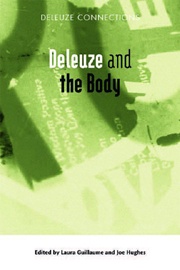Book contents
- Frontmatter
- Contents
- Introduction: Pity the Meat?: Deleuze and the Body
- DELEUZISM
- 1 Time and Autopoiesis: The Organism Has No Future
- 2 Larval Subjects, Autonomous Systems and E. Coli Chemotaxis
- 3 Bodies of Learning
- 4 Believing in the World: Toward an Ethics of Form
- 5 Matter as Simulacrum; Thought as Phantasm; Body as Event
- PRACTICAL DELEUZISM
- Notes on Contributors
- Index
2 - Larval Subjects, Autonomous Systems and E. Coli Chemotaxis
from DELEUZISM
Published online by Cambridge University Press: 12 September 2012
- Frontmatter
- Contents
- Introduction: Pity the Meat?: Deleuze and the Body
- DELEUZISM
- 1 Time and Autopoiesis: The Organism Has No Future
- 2 Larval Subjects, Autonomous Systems and E. Coli Chemotaxis
- 3 Bodies of Learning
- 4 Believing in the World: Toward an Ethics of Form
- 5 Matter as Simulacrum; Thought as Phantasm; Body as Event
- PRACTICAL DELEUZISM
- Notes on Contributors
- Index
Summary
Upon first reading, the beginning of Chapter 2 of Difference and Repetition, with its talk of ‘contemplative souls’ and ‘larval subjects’, seems something of a bizarre biological panpsychism. Actually it does defend a sort of biological panpsychism, but by defining the kind of psyche Deleuze is talking about, I will show here how we can remove the bizarreness from that concept. First, I will sketch Deleuze's treatment of ‘larval subjects’, then show how Deleuze's discourse can be articulated with Evan Thompson's biologically based intervention into cognitive science, the ‘mind in life’ or ‘enaction’ position. Then I will then show how each in turn fits with contemporary biological work on E. coli chemotaxis (movement in response to changes in environment).
The key concept shared by all these discourses is that cognition is fundamentally biological, that it is founded in organic life. In fact and in essence, cognition is founded in metabolism. Thus fully conceptual recollection and recognition, the active intellectual relation to past and future – what Deleuze will call the dominant ‘image of thought’, is itself founded in metabolism as an organic process. This founding of cognition in metabolism can be read in an empirical sense, for just as a matter of fact you will not find cognition without a living organism supporting itself metabolically. But it can also be read in a transcendental sense: for our thinkers, metabolism is a new transcendental aesthetic, the a priori form of organic time and space.
- Type
- Chapter
- Information
- Deleuze and the Body , pp. 29 - 52Publisher: Edinburgh University PressPrint publication year: 2011



